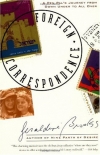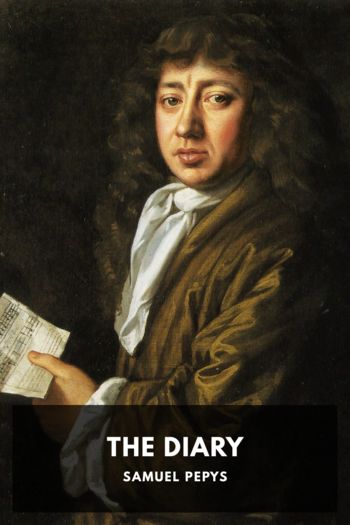Foreign Correspondence: A Pen Pal's Journey by Geraldine Brooks (finding audrey .TXT) 📗

- Author: Geraldine Brooks
Book online «Foreign Correspondence: A Pen Pal's Journey by Geraldine Brooks (finding audrey .TXT) 📗». Author Geraldine Brooks
Barry Humphries, a cruel and brilliant satirist, appeared on stage as “Edna Everage,” a suburban housewife who loves gladiolus, decorates her walls with plaster flying ducks and aspires to cruise-ship vacations. After attending one of his revues, I was mortified that we too had plaster ducks formation-flying across our sitting-room wall. The next time my mother asked me to dust, I “accidentally” dropped one, wrecking the set and causing my mother to take them down.
A few minutes’ independent reflection on what I knew about where I lived would have exposed the superficiality of these caricatures. Even our humble neighbor Edna, whose very name was a joke to Humphries, was a survivor of betrayal whose day-to-day good humor was evidence of the existence of grace. When her husband walked out on her, leaving her penniless with two sons to raise, the Catholic Church asked her to make a choice. If she ever remarried, the priest told her, she would never be able to take Communion. By choosing the Church, she condemned herself to a lonely, frugal life, taking in spinster borders to make ends meet. But over all the “cuppas” she shared with my mother, I never once heard her complain.
As for Mrs. Papas, the seamstress, her life was a modern Greek tragedy. Exiled in her girlhood to a land at the end of the earth so her wages could send a brother to school; married without her consent to a man her intellectual inferior; terrified of the blood on her wedding night, with no one who spoke her language there to reassure her; waking one morning to realize her husband hadn’t come home and finding herself unable to persuade cynical policemen that he was really missing, not adulterously AWOL; finally hearing, months later, that his body had been found in an abandoned railyard.
The intellectuals of Oz and Meanjin could be forgiven for poking fun at such people for seeming to settle for the small life of the suburbs. They didn’t know my neighbors’ stories.
It is less easy to forgive myself.
“I’ve been passing around petitions against Nixon’s invasion of Cambodia,” Joannie wrote in May 1970. “I was sent to the office for passing one around in school (would you believe you need permission … ?)”
Yes, I believed it. At my school it suddenly seemed as though you needed permission to sneeze. Not long after the assembly at which she’d told us about her work in the New York ghettos, Sister Ruth disappeared. No announcement was made, but whispers soon passed word that she had left the convent. It made sense to me: how could Bland Street hold on to someone who had walked the mean streets of Harlem? My feverish imagination conjured a romance with a handsome Black Panther, and I visualized Ruth, nun’s habit banished, wafting through the ghetto in flowing Indian prints.
Other favorite nuns also disappeared. Sister Gabriella, who had used religion classes to open our eyes to apartheid and to our own disgraceful history with Australian Aborigines, went to work in a pub and was married in no time.
The nuns who remained hunkered down in defensive reaction. The new principal was no firebrand feminist. Before you could say “Bless me, Father” we were back in the Dark Ages. Assemblies designed to open our minds to human rights and social activism were swiftly replaced with harangues on the proper way to wear our uniforms so as not to call attention to our bustlines.
But our minds had been touched beyond the reach of this attempted counterrevolution. The lay staff from Sister Ruth’s era remained, teaching us to ask the very questions that the new regime wished to avoid. An exchange teacher arrived from the United States and seemed stunned by how reserved and inarticulate we all were. She urged us to discuss things, to jump in with comments without raising our hands. She had grown up on a farm in Ohio, and she described her life there in fascinating detail.
At fifteen, I had never seen a farm. For all the mystique of the Outback, Australians are among the most urbanized people in the world, with more than ninety percent of the population crowded into the six large coastal cities. Never having been west of the Blue Mountains, the Outback was a rumor to me. My images were gleaned from my mother’s descriptions of Boorowa, embellished with vague clichés about remote sheep stations the size of Belgium where children got their schooling by shortwave radio and doctors arrived by plane.
Ohio’s patchwork of small family holdings sounded cozy—like something in a storybook. But the teacher talked also of the stifling conservatism of Midwestern rural life and how difficult it was to be a nonconformist in a community where the local church was the center of your social world. Once again, I came face to face with the fact that Sydney, for all its distance, was more culturally diverse than many other places in which I might have been set down.
Not long before she vanished, Sister Ruth hired the school’s first male teacher. Anybody else might have introduced men to our cloistered world gently, with a tweedy geriatric or two. But Sister Ruth chose Mr. Bishop, a twenty-something drop-dead-gorgeous blond with long hair and a Zapata mustache. Of course I fell in love with him. We all did. Somehow, he managed to keep an unswelled head and a straight face, as adolescents hitched up their mauve uniforms and swooned in his path.
Sister Ruth had chosen him because he happened to be an inspired teacher. Until his arrival, the geography syllabus’s dull





Comments (0)